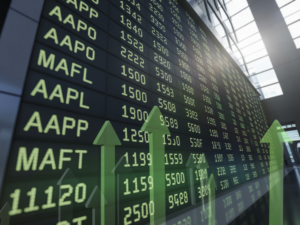DAX hit new heights, despite a faltering economy.
The German benchmark stock index hit an all-time high Wednesday, as investors grew more confident that the country would soon get a cut in interest rates. The previous day, the DAX had closed at a record high of 16,533 points, only to surpass that high at the start of trading on Wednesday. The index closed […]
The German benchmark stock index hit an all-time high Wednesday, as investors grew more confident that the country would soon get a cut in interest rates.
The previous day, the DAX had closed at a record high of 16,533 points, only to surpass that high at the start of trading on Wednesday. The index closed the day up 0.7% at 16,656 points, a new record high.
The index, which tracks the 40 most valuable companies in Europe’s largest economy, has been rising more or less steadily since late October. At the end of that month, official estimates showed that inflation in the 20 countries that use the euro had slowed sharply to its lowest level in more than two years.
Price increases, which had forced the European Central Bank into an unprecedented cycle of interest rate hikes, eased further in November to 2.4%.
Investors’ expectations that borrowing costs would not be raised again received a boost on Tuesday when ECB board member Isabel Schnabel effectively ruled out further hikes, citing a “remarkable” fall in inflation. Schnabel told Reuters that the central bank was on track to bring inflation down to its 2% target, making “a further rate hike rather unlikely”.
However, the stock market gains are at odds with the fragile state of the German economy, which has underperformed other major regional economies such as France, Italy and Spain. Germany’s gross domestic product shrank 0.1% in the third quarter from the previous three-month period.
In the latest sign of the country’s troubles, preliminary official data showed Thursday that industrial production in Europe’s manufacturing powerhouse fell 0.4% in October from September, the fifth straight month of declines.
Wednesday’s gains on the DAX were led by Volkswagen, Europe’s largest automaker, which closed up 5.4%.
A day earlier, the company said an independent audit of a plant it owns with SAIC Motor in China found no evidence of forced labor. Volkswagen has faced criticism over the factory in Xinjiang, a region where human rights groups have documented the use of forced labor. China denies any abuses.




